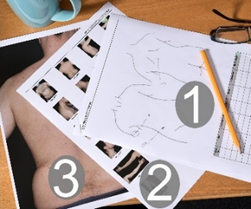Neurodiversity information for parents and young people
About the mole mapping service
This service takes digital photos of your whole body, including your limbs, to map the moles on your body. These photos are taken by our medical photographer.
They are given to your healthcare professionals (consultants and clinical team) so they can monitor the condition of your skin over a long period of time.
They use these photos to review your case and they will talk to you about this at your next consultation.
How to help monitor your own skin condition
We will give you a set of your own digital photo prints. The mole mapping photographer will give you more information about how to use these to self-monitor the way your skin changes over time.
How we store images of your body
All mole mapping photos are stored on the hospital’s secure server. They form part of your personal medical records and can only be seen by appropriate medical teams.
Further information on Kingston and Richmond NHS Foundation Trust Privacy Policy
Making an appointment for mole mapping
Usually, the dermatology team at Kingston Hospital will refer you to the medical photography service. In most cases, they will also give you a written request form to pass on to the photographer when you arrive for your appointment.
Once you have been referred, you can make an appointment by phoning Medical Photography directly (see Contacts section). When you call, ask for an appointment for the mole mapping service.
What happens during your appointment
Mole mapping usually takes about 30 to 40 minutes.
Before photos are taken of your body, a member of the clinical team or the photographer will ask you to sign a written consent form. This gives Kingston Hospital permission to take and store your medical images.
The mole mapping service takes photos of your body, including limbs which do not have moles. This means you will have to undress, but you can keep your underwear on. The photographer will give you a gown and show you into a private changing area.
Do not wear makeup or jewellery during your appointment so that the photographer can take clear images.
Taking someone with you to your appointment
Kingston Hospital has one medical photographer, who is male.
Some patients, for example females, may want to take a chaperone (someone who can stay with them while the photographs are taken).
If you want a chaperone, bring someone with you to the appointment.
If you are unable to bring someone with you, let the photographer know when you book your appointment. They will be able to arrange for a female chaperone to be present when you have your photos taken.
After your appointment
If you have a follow-up appointment with the Kingston Hospital dermatology team, they will use the digital photos to check your moles thoroughly and discuss them with you.
They will have access to the digital photos, but it will help if you take the following printed documents to your appointment (as shown in the numbered picture).
- Any self-monitoring records which you have been keeping.
- The printout of the table of contents.
- The set of digital photos which the medical photographer sent you.
These will all be used as visual aids to discuss your condition.

If you do not have a follow-up appointment
If you do not have a follow-up appointment with the dermatology team, but are still worried about the changing condition of your moles, make an appointment with your GP to discuss your case.
Contact information
Medical Photography, Princess Alexandra Wing (Dental), Monday to Friday, 9 am to 1 pm and 2 pm to 4.45 pm